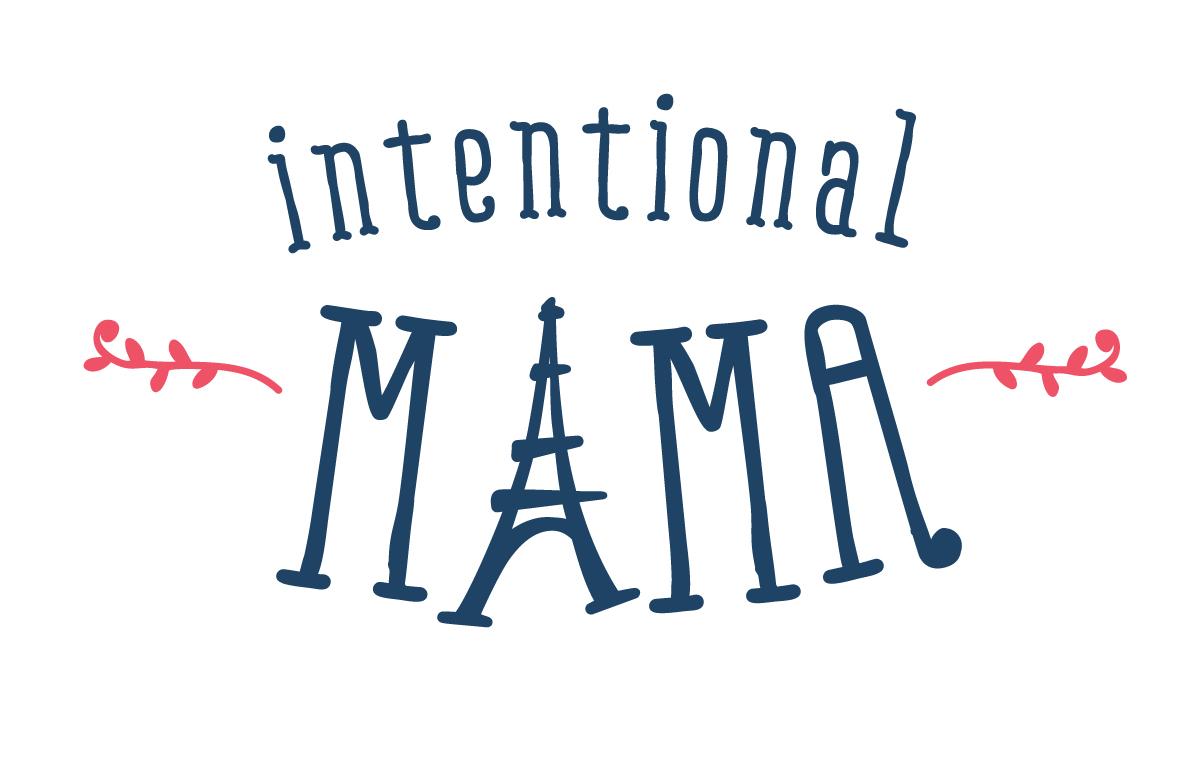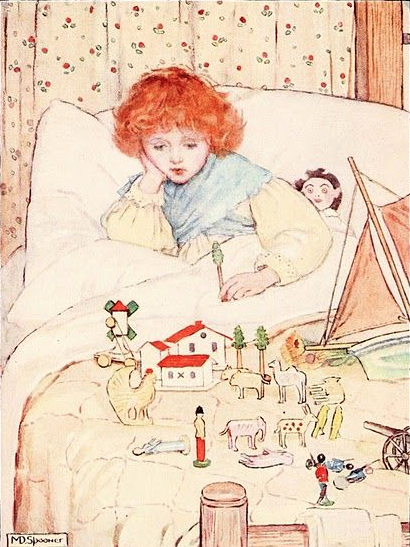5 Aspects of Covid-19 I Didn't Know Until I Experienced it Myself
One year into the Coronavirus lockdowns here in Oregon, I caught the Coronavirus myself. This month, March 2021, is an interesting time to have had Covid-19 since our state is at one of its lowest rates of infection and some businesses are starting to relax their regulations. I suspect I caught the Coronavirus at the grocery store since I hardly go anywhere else and I spent over an hour there amidst many shoppers on a Saturday afternoon five days before I got a fever. (For the curious, I was wearing a mask as required, but that probably isn’t the panacea that we’d like to think it is when we consider that mask mandates have not kept developed countries from high rates of infection.)
The Land of Counterpane by Minnie D. Spooner (1905)
Thankfully my fever was moderate (100-101) and only lasted two days; that was my only symptom at first. I got tested on the third day when I felt better. That night I went to bed late and didn’t fall asleep until after 1am, and that lack of sleep may have prolonged my symptoms. The fourth day I got my test results confirming that I was Covid positive, and I realized I still had a sub-clinical fever (in the 99s) as well as a bit of chest congestion. Once I realized I had a Covid infection, I took high dose vitamin D (which I had taken the month prior to infection as well) and daily zinc, according to a nurse friend’s recommendation and the I-MASK protocol now being used by some medical schools and hospitals. The sixth day of symptoms was my first day without a fever but also the day I developed a drippy nose and sneezing, along with a sudden loss of taste. I felt weak and tired but otherwise fine. Thankfully I felt completely better by the end of the seventh day and my taste and smell returned three days after they’d vanished.
At no point did I have any stuffiness or trouble breathing. I would like to believe that my high vitamin D intake the month prior to infection was helpful in shortening my infection, but that can't be proven. My friend in Western Africa shares that Ivermectin is highly effective there (and it's gaining validity here in the U.S.) but I didn’t try to obtain it as it is still experimental.
Here are 5 things I didn't know about Covid until I contracted it myself:
1. It can increase your resting heart rate, particularly at night.
As an avid runner, I should have paid attention to this sooner since my heart rate is usually low. I think my high resting heart rate (over 100, and sometimes higher) actually started a day or two before my fever, and had I known this was a Covid sign, I would have avoided others much sooner. Thankfully no one I had contact with beforehand caught it from me (and I had close contact with at least two dozen adults in the two days prior, several of them at my own home). My resting heart rate remained high at night until about the tenth day. Sometimes a high heart rate is linked to dehydration, but my doctor said it was my body's way of fighting the virus and it was not concerning in this context.
2. Hunger and weight loss can arrive together:
My sister-in-law brought Tom Yum soup with lots of herbs—supposedly a Covid cure in Thailand. My fever did break the next day. Either way, it's delicious! (photo by Lummmy)
In English we say, "Starve a fever; feed a cold.” SARS-CoV-2 often provokes a fever and seems like a cold, so it doesn't surprise me that at the beginning I had no desire to eat yet for the rest of my infectious period I was ravenous. On the first day of fever I only ate a handful of blueberries and an apple. The second day my hunger returned and I ate second helpings of soup and bread. I was ravenously hungry from then on, especially because I'm breastfeeding my four-month-old son. Nonetheless I lost roughly ten pounds in the first few days of Covid, taking me down to my weight at age 15, and even though I am eating heartily now I'm not yet back to my normal weight. It was a good reminder to me that thinness and weight loss do not necessarily equate with health. Honestly I hope to gain some muscle and weight back soon but I won't start running again until next week at my doctor’s recommendation since she and I want to make sure my heart is ready for intensive exercise again.
3. The loss of taste and smell is not due to nasal congestion.
Many viruses can cause a temporary loss of taste and smell, so when I heard that this was a fairly common Covid symptom I assumed it was due to stuffy nasal passages. I was surprised then, when I woke up on the sixth day of infection able to breathe perfectly, but realizing I could no longer smell the eucalyptus oil from the humidifier that I had filled the night before. My hunch of lost taste was confirmed soon after when I had pancakes with maple syrup for breakfast yet I could not taste the sweetness at all. For the next three days, food was still satisfying and sated my hunger, but eating became a completely textual experience. I found myself enjoying foods that I normally wouldn’t eat in ample quantities, like dikon radish (so juicy and crunchy!) and disturbingly green moringa powder smoothies that I normally dislike. (For a medical explanation, it appears that the loss of taste and smell is probably due to the virus attaching to the ACE2 proteins of the supporting cells in the nasal epithelium. In other words, it is not due to a stuffy nose.)
4. Medical policies regarding Covid-19 can be frustrating.
“Ceci n’est pas un masque.” (My three-year-old son)
Several weeks after I was no longer contagious, I took my four-month-old son to our medical clinic for his well-child checkup . . . but to my shock, our pediatrician refused to do the check-up because my baby's older sibling (my six-year-old son) had tested positive for Covid six days prior to our appointment. (My six-year-old son appears to be the only family member who caught the virus from me—he had a 100.3 fever for a day; thankfully it was gone by bedtime and he has been full of energy since). What I hadn’t known, however, was that our Kaiser clinic has a policy preventing care providers from seeing any siblings of a child who recently tested positive for Covid (because they presume that the siblings are also likely to be infected yet asymptomatic). Policies don’t always account for unique circumstances, however, and I explained that my baby had been exposed to Covid-19 when I was sick several weeks prior, and since he is exclusively breastfed he surely has plenty of antibodies from my infection. (The Coronavirus is not passed in breastmilk, but antibodies are.)
Nonetheless, while I was waiting in the exam room with my baby (for 45 minutes!), both the medical assistant and pediatrician individually told me that they could only examine the baby at that visit if I said he was sick. In other words, they would examine him if I said he was ill with Covid or anything else but they would not examine him if he were well but could be asymptomatic. The pediatrician was already decked out in her protective gear and spent as much time trying to explain this and to reschedule the appointment as it would have taken her to examine him for the original well visit. She did admit that my antibody logic was correct but she claimed she had to follow Kaiser’s policy. I was frustrated that my child couldn’t be examined for his well visit. When they believe is more important to follow policy than to provide preventative care for a patient, I'm convinced that our medical system has lost sight of its purpose. Surely my family's pediatrician did not enter medical school with the idea of turning away young patients because they might be sick and contagious . . . but now her clinic’s policy is having her do exactly that unless a sick visit is scheduled.
5. Covid’s contagious period and the low likelihood of reinfection:
A person with Covid-19 is considered contagious for ten days after symptom onset, but he or she can continue to test positive for three months after infection. Because of this, retesting (in an attempt to get a negative result) is no longer recommended. Any positive test result within the three months after infection is considered to be the same infection. Even so, after ten days that include a final 24 hours without a fever, a person is no longer believed to be infectious. Some of the latest research shows that antibodies from natural Coronavirus infection last at least eight months and are quite effective against further infection. So far, the few people who experience reinfection tend to have a more mild case due to preexisting antibodies from the first infection. That’s encouraging to me and I'm so glad to have had the virus and to be past it for a while. Antibodies are awesome, and while they’re only a part of overall health, I’m grateful that my immune system is functioning well.
How has your learning or perspective on Covid-19 changed over time? How has this pandemic affected you for better or for worse? What are your hopes for the future in light of the current restrictions?
* If you read French, you may find Professor Henri JOYEUX's newsletters informative on Covid and other medical topics. He is a French cancer oncologist with an interest in nutrition and he has a reputation for his alternative views on family and vaccines. (He is not anti-vaccine, but cautious and measured in his assessment of them, advising prudence but also advising vaccination under certain conditions). He and his wife are in their 70s and claim to have recently recovered from their second bout of Covid infection; he discusses his personal treatment protocol and his recommendations for immune health in his recent French newsletter here.
Disclaimer: My story of SARS-CoV-2 infection and recovery is not intended as medical advice and does not replace a doctor’s advice or oversight.




